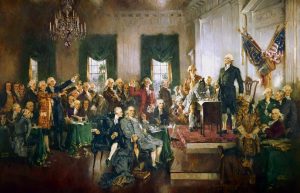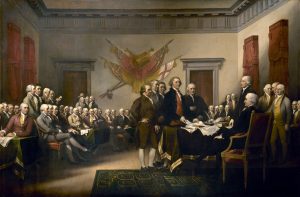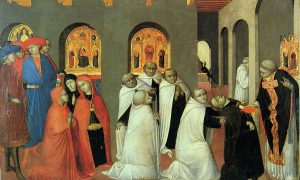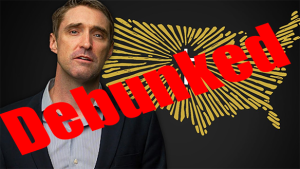“Do your best to present yourself to God as one approved, a worker who has no need to be ashamed, rightly handling the word of truth.” – 1 Timothy 2:15
In a previous post, we discussed the teachings of Dominionism: the belief that the church is called by God to take up positions of political authority. One of the Bible verses that is referenced time and again by Dominionist teachers is Matthew 28:19, a passage in scripture known as The Great Commission.
“The Church needs to expand its vision of what it means to make “disciples of all nations” (Matt. 28:19).” – Lance Wallnau, The Seven Mountains Mandate
“Take, for instance, Jesus’ Great Commission: “Go therefore and make disciples of all the nations…” (Matt. 28:19 NKJV). Previously many of us interpreted that to mean that we were to go into the nations in order to win as many souls as possible. Now in light of the dominion mandate, we take it literally and see that we are to disciple nations as whole social units.” – C. Peter Wagner, Stewarding for Reformation
“The mission assigned to the Church in the Great Commission is the eradication of idolatry in the entire world.” ― Douglas Wilson, Mere Christendom
We see this verse being used again and again as a justification for Christian Nationalism. The claim being that “all nations” clearly shows us that Christ commands the church to power, not just converts. The first problem with this is that “Therefore go and make disciples of all nations” is only half of the verse.
“Therefore go and make disciples of all nations, baptizing them in the name of the Father and of the Son and of the Holy Spirit,” (Matthew 28:19)
Yes, “Therefore go and make disciples of all nations” on its own may sound like a call for political conquest, but when paired with “Baptizing them in the name of the Father and of the Son and of the Holy Spirit,” the call is clearly for something different than what these Christian nationalist teachers are calling for. If you look closely, you’ll see that the verse ends in a comma. This means that even looking at all of Matthew 28:19 without context is a problem because it’s not a full sentence.
“Therefore go and make disciples of all nations, baptizing them in the name of the Father and of the Son and of the Holy Spirit, and teaching them to obey everything I have commanded you. And surely I am with you always, to the very end of the age.” (Matthew 28:19 -20)
Looking at this as a whole sentence you’ll see that the first and third clauses are actually connected together as one thought. The Greek word that is translated as “disciples” is matheteusate (μαθητεύσατε), the imperative verb form of Matheteuo (μαθητεύω), derived from the noun mathētēs, which translates as student, pupil, or disciple. When you pair this with the call to “teach them to obey everything I have commanded you,” you realize this is not a list of three separate tasks. Rather, “baptizing them in the name of the Father and of the Son and of the Holy Spirit” is a parenthetical phrase appearing between the connected actions of “making disciples (students)” and “teaching”.
Taking a step back, translating mathētēs directly to “student” is actually an oversimplification. A mathētēs is a student, but more specifically it is the student of a philosopher. In Greco-Roman culture, philosophers were educated individuals who would go from town to town teaching and debating, and people would gather to hear their lectures and discussions. Some people would follow them, listening to all their lectures and dedicating their lives to the Philosophers teachings.
We also see a similar idea in Jewish Rabbis of the age. They taught God’s word rather than philosophy, but they functioned the same way philosophers do. Going from town to town giving lectures which people would gather to listen, taking on disciples as they went. We actually see Jesus repeatedly referred to as a Rabbi (Mark 9:5; Mark 11:21; Mark 14:45; John 1:38). We also see Paul being invited to meet with philosophers in Athens (Acts 17:18), to explain to them the teachings of his Rabbi Jesus.
“Matthew 28:16 – 20 says “Therefore go and make disciples of all nations, baptizing them in the name of the Father and of the Son and of the Holy Spirit,” Disciples, not just converts of all nations but disciples, care about the welfare of the nation you are in. We are called to be disciples to Christ.” – Charlie Kirk, Should Christians Get Involved In Politics?
This is simply untrue. The great commission is a call to bring disciples to Christ, yes, but it has nothing to do with the welfare of our nations. A disciple is a student who has willingly and joyfully dedicated their entire life to the teachings of their Rabbi. The great commission is nothing more or less than Christ commanding us to go forth teaching the word of God to all who will listen and to baptize those who hear these teachings and dedicate their lives to following Christ.
Being Public With Your Faith
There is a central teaching of the Dominion Theology we have yet to discuss called “Stealth Evangelism”. This is the belief that Christians are called to go about converting people and teaching God’s word through more underhanded means.
“Serving simply to get people saved is a religious agenda. As pure and noble as it may seem to us as believers, it is manipulative to the world and is viewed as impure service. The world can smell it a mile away. We put them on the defensive when we carry such reasons for serving into their sphere of responsibility.” – Bill Johnson, Dreaming With God
“I interviewed a key Washington leader who is often referred to as the “stealth Billy Graham” because of his influence behind the scenes with leaders of the nations and foreign governments.” – Lance Wallnau, The Seven Mountains Mandate
The concept of “Discipleship” as seen in The Great Commission works in direct opposition to these ideas of “Stealth Evangelism”. We are to be public with our faith and witness, teaching so that all people may hear the calling to Christ. We see this idea backed up elsewhere in scripture by the words of Christ and the writings of the apostles.
“Let your light shine before others, so that they may see your good deeds and give glory to your Father who is in heaven” (Matthew 5:16)
“for, “Everyone who calls on the name of the Lord will be saved.” How, then, can they call on the one they have not believed in? And how can they believe in the one of whom they have not heard? And how can they hear without someone preaching to them?” (Romans 10:13 – 14)
Understanding “of all nations”
Until fairly recently in human history, a man’s nation was synonymous with his ethnicity. Your culture and racial identity were usually determined by your geographical place of birth. Only within the past two hundred fifty years has this changed. The call to make disciples of “all nations” is simply a declaration that the gospel is to go to the Gentiles as well as the Jews. Something which we see repeated over and over again in scripture (Romans 1:16, Galatians 3:28, Romans 10:12). For in the beatific vision, we see people from all nations present. Now unified as citizens of the Eternal Kingdom.
“After this I looked, and there before me was a great multitude that no one could count, from every nation, tribe, people and language, standing before the throne and before the Lamb. They were wearing white robes and were holding palm branches in their hands.” (Revelation 7:9)
The Acts of The apostles
The meaning of the great commission is obvious if we simply look to the example of the apostles and the early church. We do not see the apostles striving for political conquest, we do not see them focusing on evangelizing to only individuals with power and wealth, and we certainly do not see them push for a “Christian nation” outside of the Heavenly Kingdom of God. What we see is them going back and forth sharing the word of God to all who will listen regardless of status or power. Yes, they evangelize to Court Eunuchs (Acts 8:26-40), Centurions (Acts 10), and Governors (Acts 23), but they do not seek these powerful people out. Instead, they come to be in the presence of these powerful people by random circumstance, and share the good news with them as they would share it with anyone else.
Christs Authority
Let’s go back and look at Matthew 28:18, the verse that comes before the great commission. “Then Jesus came to them and said, “All authority in heaven and on earth has been given to me.” Do not forget this fact. Any who serve in government or hold power of any kind have been given that power temporarily by Christ. While he is not responsible for what they do with that power, we are promised that they will answer for abusing it one way or another (See Psalms 81:1-7, Micah 3:1-3, Luke 12:48).
“As long as the church thinks the purpose of the great commission is anything less than penetrating and occupying the mind molders of the nations in order to bring about a sustained influence that shapes the culture, we are asleep.” – Lance Wallnau, The Seven Mountains Mandate
This is simply not true. If there is any influence that must be exercised over cultures or “mind molders” that work is the responsibility of Christ and Christ alone. Do not hold Christ’s Church responsible for the crimes of tyrants. The wicked kings, godless lords, and corrupt judges of this age will answer for there sins and be held responsible for there crimes.
“Woe to those who make unjust laws,
to those who issue oppressive decrees,
to deprive the poor of their rights
and withhold justice from the oppressed of my people,
making widows their prey
and robbing the fatherless.” (Isaiah 10:1-2)
Sources:
Johnson, Bill and Lance Wallnau. Invading Babylon. Destiny Image, 2016.
Johnson, Bill. Dreaming with God: Secrets to Redesigning Your World through God’s Creative Flow. Destiny Image, 2007.
Kirk, Charlie. “Should Christians Get Involved In Politics? (URGENT) | Charlie Kirk.” YouTube, YouTube, www.youtube.com/watch?v=BWQEj18xJuA&t=1020s. Accessed 27 Aug. 2025.
Wallnau, Lance. “The Seven Mountains Mandate.” In The Reformer’s Pledge, edited by Che Ahn et al., 177-194. Shippensburg: Destiny Image Publishers, 2010
Wilson, Douglas. Mere Christendom. Canon Press, 2023.
Wagner, C. Peter. “Stewarding for Reformation.” In The Reformers Pledge, edited by Che Ahn et al., 195-213. Shippensburg: Destiny Image Publishers, 2010.



